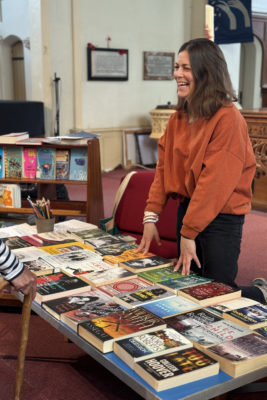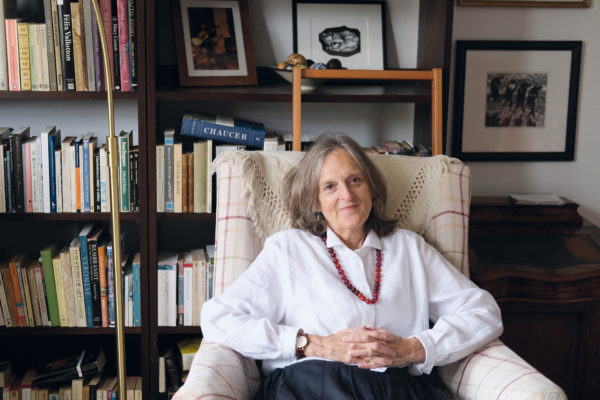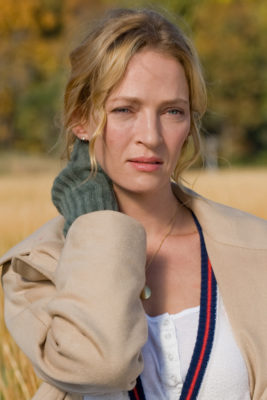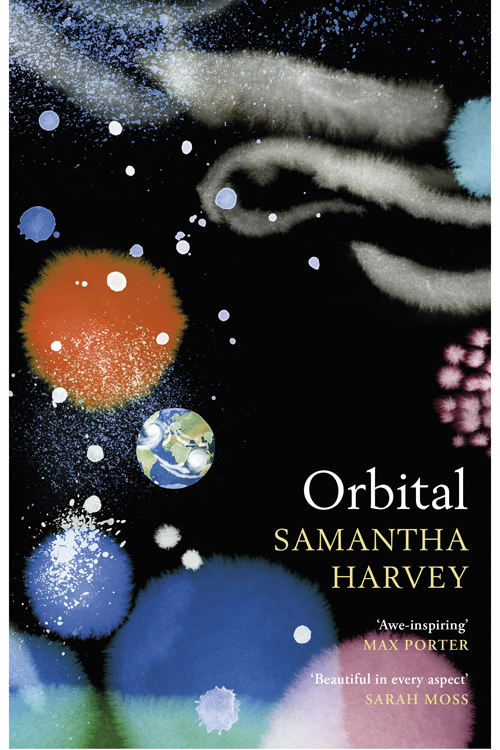
Is The 2024 Booker Prize Winner Worth The Read?
By
8 months ago
And the winner is…
Samantha Harvey has bagged the 2024 Booker Prize for her fifth novel, Orbital. Recognised by the esteemed judging panel for its ‘beauty and ambition’, here’s what to expect before you crack the spine.
2024 Booker Prize Winner: Orbital By Samantha Harvey
The first woman to win since 2019 (when the prize was jointly awarded to Bernardine Evaristo for Girl, Woman, Other and Margaret Atwood for The Testaments) following a history-making women-dominated shortlist, Samantha Harvey is 2024’s Booker Prize winner with her fifth novel, Orbital. But these aren’t the only firsts Orbital has achieved:
- It is the Booker Prize’s second shortest novel in history, weighing in at just 136 pages long
- Orbital covers the shortest time frame of any Booker winner, taking place over just 24 hours
- It is the first Booker winner set in space
- Harvey is the first British winner since Douglas Stuart’s 2020 win for Shuggie Bain
- Orbital achieved impressive sales ahead of its win, selling more copies than the past three winning titles combined had sold up to the eve of their success
The twenty-first woman to win the prize since its inception in 1969, news of Harvey’s win was unveiled at a star-studded event at Old Billingsgate in London, with Gillian Anderson, Adjoa Andoh, Charles Dance, Michelle Gayle, Krishnan Guru-Murthy, Lenny Henry, Ruth Jones, Ben Miller and Sara Pascoe all in attendance. Author and campaigner Baroness Lola Young also delivered a keynote speech, drawing on her experiences growing up in the care system. ‘Books enabled me to imagine a place where everyone had the right to read whenever and whatever they liked,’ Young shared. ‘Becoming confident with the written word shouldn’t be a pleasure restricted to the privileged.’
Harvey’s winning book was selected from a shortlist of six novels, five by women and one by a man. You can recap the 2024 shortlist and longlist here. Harvey receives £50,000 and a trophy, which was presented to her by Paul Lynch, last year’s winner. Each of the shortlisted authors, meanwhile, receives £2,500 and a hand-bound edition of their book designed by six Fellows of the Designer Bookbinders society.
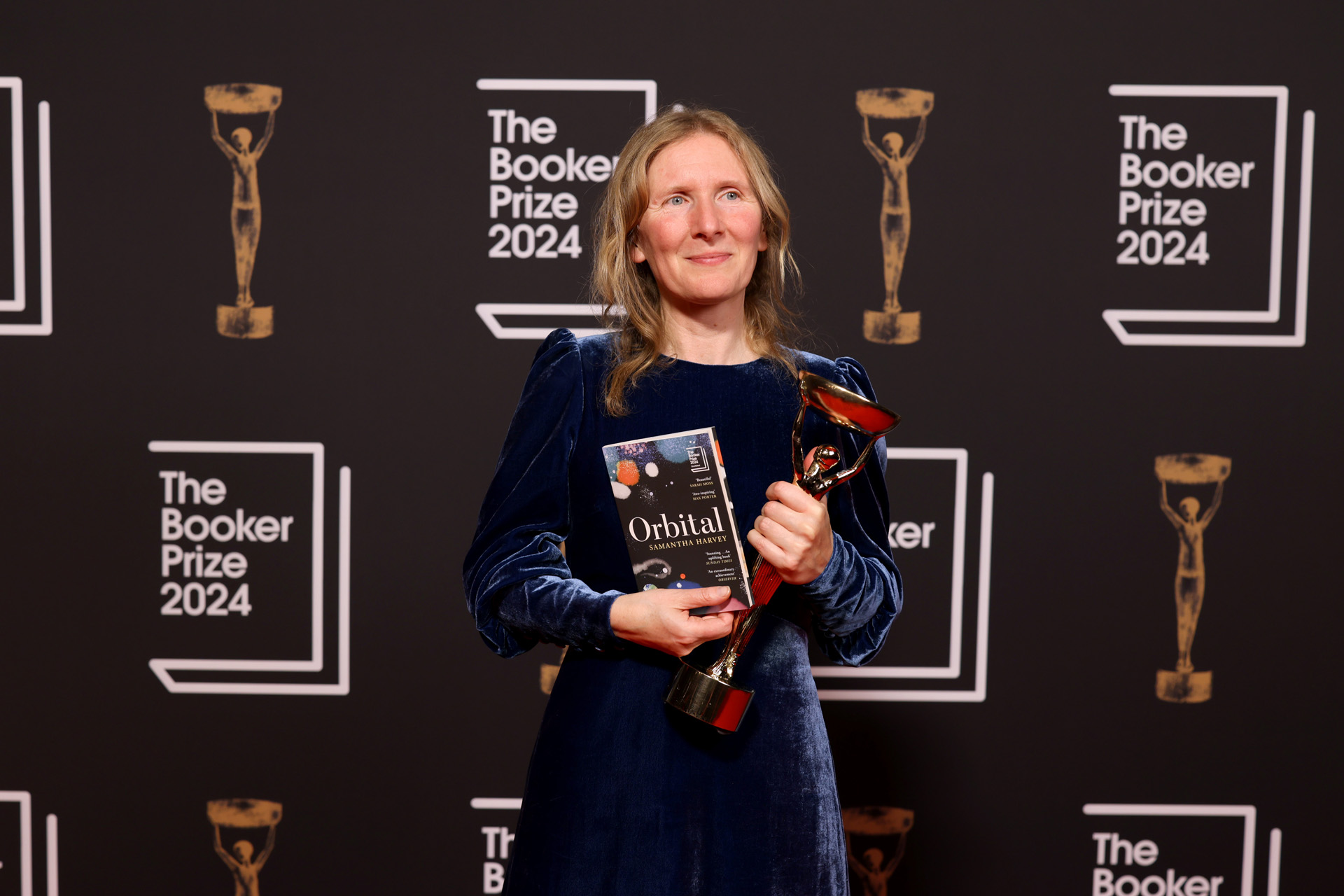
Samantha Harvey wins the 2024 Booker Prize with Orbital
What Is Orbital About?
Set entirely in space and described by Harvey as ‘space pastoral – a kind of nature writing about the beauty of space, with a slightly nostalgic sense of what’s disappearing’, Orbital takes place over a single day in the life of six astronauts and cosmonauts aboard the international space station. During these 24 hours – a typical 24 hours orbiting Earth – they witness 16 sunrises and sunsets, and chronicle their silent blue planet from above, taking in continents, seasons, glaciers, deserts, mountain peaks, ocean swells and even a swirling tornado.
While it is set in space, Orbital isn’t your classic sci-fi novel. ‘I never saw this novel as being against sci-fi, but I didn’t see it as having an awful lot in relation to it either,’ Harvey says. At just 136 pages long, it’s a lyrical meditation on the splendour of our planet, also reflecting on the individual and collective value and every human life. It’s a timely read, reflecting on a planet in crisis from thousands of miles away: where borders are invisible, as are votes, wars and all geopolitics.
‘As judges we were determined to find a book that moved us, a book that had capaciousness and resonance, that we are compelled to share,’ chair of judges Edmund de Waal shares. ‘We wanted everything. Orbital is our book. Samantha Harvey has written a novel propelled by the beauty of sixteen sunrises and sixteen sunsets. Everyone and no one is the subject, as six astronauts in the International Space Station circle the earth observing the passages of weather across the fragility of borders and time zones. With her language of lyricism and acuity, Harvey makes our world strange and new for us.
‘All year we have celebrated fiction that inhabits ideas rather than declaiming on issues, not finding answers but changing the question of what we wanted to explore,’ de Waal adds. ‘Our unanimity about Orbital recognises its beauty and ambition. It reflects Harvey’s extraordinary intensity of attention to the precious and precarious world we share.’
Harvey began the novel many years ago, but returned to it in lockdown. She originally abandoned the project after a ‘crisis of confidence’. ‘I’ve never been in space, I could never go to space, and there are humans who’ve been to space who write very lucidly about it, so who am I to do this?’ she said in an interview with BBC Radio 4’s Front Row programme. But revisiting her idea in lockdown, Harvey found the idea ‘resonant’ to lockdown, ‘of not being able to escape each other and also not being able to get to other people’.
‘I would have footage of the Earth in low Earth orbit on my desktop all the time as I wrote. It was my main reference point. It felt such a beautiful liberation to be able to do that every day, and at the same time I was writing about six people trapped in a tin can,’ she added.
Is It Worth Reading?
Harvey’s fifth novel (and sixth book) is her best to date, and the Booker Prize win cements this. It was widely acclaimed by critics, with Wendy Smith of the Boston Globe commending ‘the sense of wonder and delight conveyed by Harvey’s elegant prose and philosophical musings’. Meanwhile, James Wood wrote in The New Yorker: ‘Samantha Harvey, one of the most consistently surprising contemporary British novelists, becomes something like the cosmic artificer of our era with her slim, enormous novel Orbital, which imaginatively constructs the day-to-day lives of six astronauts aboard the International Space Station. Orbital is the strangest and most magical of projects, not least because it’s barely what most people would call a novel but performs the kind of task that only a novel could dare.’
Critics also praised the urgent message woven through Orbital: ‘Harvey blends prose of poetic beauty (“over its right shoulder the planet whispers morning – a slender molten breach of light”) with a clarion call to take responsibility for where we live,’ Susie Mesure wrote in the i.
With the majority of our population never to leave planet Earth – Harvey herself has never been to space – Orbital epitomises the escapism reading offers. Rather than escaping to another world, however, Orbital pulls readers off our planet and suspends them in orbit above her. It’s a perspective we are privileged enough to see videos of, captured by real people, astronauts, constantly floating in the distant skies above us on the real International Space Station. But to experience this in the mind’s eye is truly unique – if slightly anxiety inducing. If the concept of space instils a sense of existential dread in you (like it does for this writer), the beautiful poetics of Harvey’s novel doesn’t drown out the frightful nature of space. But if you’re unbothered by the infinitude of the universe, at only 136 pages, it’s easy to fly through Orbital – making it totally worth the read.
BUY IT
Orbital by Samantha Harvey is published by Jonathan Cape. Paperback, £9.99. bookshop.org
Samantha Harvey’s first public event as the winner of the Booker Prize 2024 will take place at Waterstones Piccadilly in London, tomorrow evening (Thursday 14 November), in conversation with Gaby Wood. Tickets are £10 and can be booked here.




